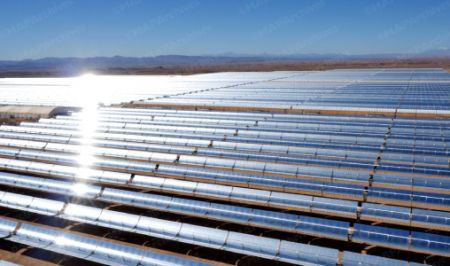Under HM the King’s Reign, Structural Economic Progress Driving an Emerging Morocco

Driven by a strategic and multidimensional Royal Vision, this transformation has taken shape through the implementation of ambitious sectoral strategies based on the principles of sustainability, inclusion, and resilience. These efforts have enabled Morocco to move beyond traditional growth models and lay the foundations for inclusive, transformative, and sustainable development.
This is the view of African Development Bank (AfDB) President Akinwumi Adesina, who stated in an interview with MAP on the occasion of Throne Day celebrations that since His Majesty King Mohammed VI’s accession to the Throne, “large-scale projects and strategic initiatives have taken shape and delivered tangible, far-reaching results.”
“Morocco, a modernized country, is now among Africa’s most stable economies and has risen to the ranks of the continent’s most advanced nations, thanks to strategic reforms launched under the Sovereign’s leadership,” Adesina said.
Coherent Sectoral Strategies for a Diversified Economy
Morocco has strengthened its regional and international standing through the adoption of integrated and harmonized sectoral strategies, driven by His Majesty King Mohammed VI.
Key initiatives such as the “Generation Green” strategy, the new national energy roadmap, the 2021–2026 Industrial Acceleration Plan, the national logistics development strategy, the Halieutis Plan for fisheries, and the 2030 vision for sustainable tourism have redefined the foundations of the national economy.
These strategies have positioned Morocco among the leading countries in high value-added sectors such as automotive, aerospace, phosphates, green hydrogen, and renewable energy, enhancing its appeal to international investors seeking competitive and innovative markets.
Modern Infrastructure to Boost Competitiveness
Infrastructure modernization is a cornerstone of Morocco’s economic transformation. The country has launched a large-scale development program focused on transport, logistics, and connectivity to promote territorial integration, facilitate the movement of goods and people, and support competitiveness across economic sectors.
The Tanger-Med Port, now one of the leading container ports in the Mediterranean and Africa, exemplifies this ambition. With its logistical capacity, multimodal connectivity, and proximity to major shipping routes, the port has become a key driver of Morocco’s export growth, industrial integration, and attraction of high-value foreign investment.
Meanwhile, expansion of the national motorway network and reinforcement of the rail system — notably with the high-speed Al Boraq line between Tangier and Casablanca — have significantly reshaped Morocco’s mobility landscape.
Built to international standards, these infrastructures reflect a forward-looking strategic vision to position Morocco as a regional and continental connectivity hub.
A Model Energy Transition
Morocco’s energy transition is guided by a deliberate and sustainable vision championed by His Majesty King Mohammed VI. The Kingdom has long committed to a balanced, resilient, and environmentally friendly energy mix by leveraging its natural resources and developing large-scale green energy infrastructure.
The National Energy Strategy to 2030 — targeting over 52% of renewable energy in the electricity mix — is a key milestone.
This policy is embodied by flagship projects such as the Noor Solar Complex in Ouarzazate, wind farms in Tarfaya and Midelt, and integrated hydroelectric stations.
At the same time, Morocco is bolstering its position in future-oriented sectors, particularly green hydrogen, where the Kingdom aims to become a global reference. This reflects a strategic determination to combine energy sovereignty, economic competitiveness, and climate action while ensuring a fair and inclusive transition that benefits all citizens.
A Business Climate in Continuous Improvement
In line with the High Royal Directives, Morocco has implemented a series of reforms aimed at significantly improving the business environment to attract productive investment.
Key initiatives include streamlining administrative procedures, digitizing public services, and strengthening the regulatory framework.
A major step forward was the enactment of the new Investment Charter in 2023. It aims to steer investments toward priority sectors, reduce regional disparities, and support local entrepreneurship. Focused on performance and measurable outcomes, the Charter introduces a results-based support system and enhances the governance of investment policy.
The creation of one-stop investor services, reduction in business registration times, reforms to corporate law, and the introduction of commercial mediation mechanisms have all contributed to improved transparency and a more favorable environment for entrepreneurship.
These efforts have translated into Morocco’s steady rise in international rankings on competitiveness and ease of doing business.
Special attention has also been given to economic inclusion for youth, women, and innovators, through enhanced support mechanisms, entrepreneurship financing, and the creation of ecosystems conducive to innovation.
Together, these achievements demonstrate Morocco’s firm commitment to building a fairer, more modern, and more resilient economy.
A Strategic Position on the Continental Stage
Under Royal impetus, Morocco has adopted a new approach to African cooperation, built on solidarity, shared responsibility, and co-development.
This proactive economic diplomacy has resulted in an expanded Moroccan presence across the continent, with multidimensional partnerships in agriculture, finance, energy, health, housing, and education.
The establishment and expansion of Moroccan companies in several African countries — notably in banking, telecommunications, construction, insurance, and distribution — reflect this strategic orientation.
Bilateral agreements have also been signed with numerous African states to promote investment, facilitate trade, and support large-scale regional projects.
The economic progress achieved under His Majesty King Mohammed VI is a testament to a clear and strategic vision, and a strong commitment to development.
By continuing on this trajectory, Morocco aims to solidify its position as an emerging regional power, a pillar of stability, and a trusted partner on the international stage.